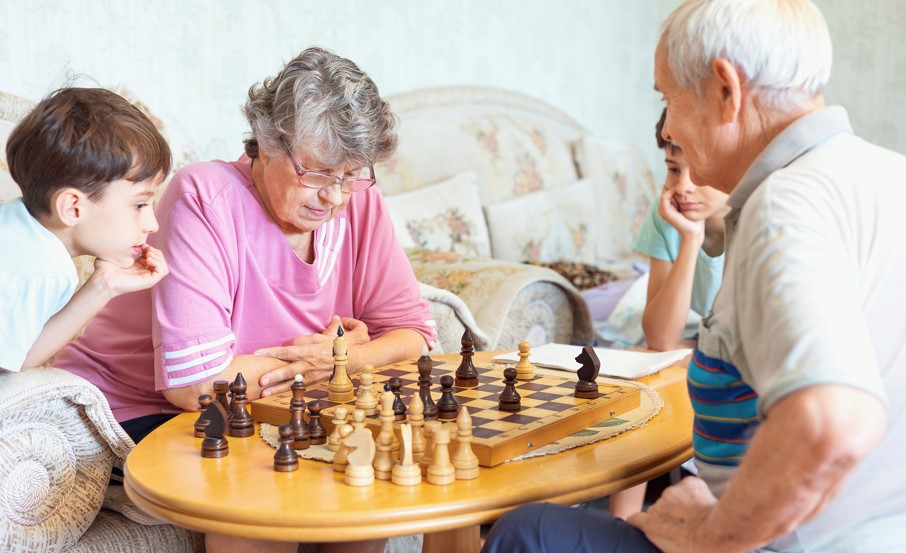As we grow older, our brains are like well-worn paths—familiar but sometimes in need of a little extra maintenance to stay sharp. Enter strategy games. These mental challenges are more than just entertainment; they’re like gym sessions for the mind. Games like chess, Go, and shogi engage the brain in ways that mimic problem-solving and planning in real life, offering a workout for memory, attention, and critical thinking. They activate regions in the brain associated with reasoning and logic, keeping neural connections firing even as we age.

By requiring players to think several moves ahead, these games enhance cognitive reserve—the brain’s ability to adapt and reroute functions when it encounters challenges. This adaptability is key for seniors looking to maintain mental sharpness and stave off conditions like dementia.
Here are a few strategy games known for their powerful brain-boosting effects:
Chess: A classic game of foresight and tactical planning, chess has been linked to improved problem-solving and memory retention.
Go: This ancient game requires strategic flexibility and spatial awareness, keeping the mind nimble and creative.
Shogi: The Japanese variant of chess, shogi pushes players to think on their feet with unique game mechanics like piece reuse.
Backgammon: Combining luck with strategy, backgammon encourages quick thinking and pattern recognition, critical for keeping the brain sharp.
Damas (Checkers): Simple but deeply strategic, this game helps improve attention and decision-making skills.
With these games, older adults can engage in a fun yet mentally challenging way to keep their minds vibrant and healthy for years to come.
Brain-Boosting Benefits: How Strategy Games Keep the Mind Young
Memory Enhancement: Training Your Brain to Remember
One of the first cognitive abilities we notice declining with age is memory. It becomes harder to recall names, events, or even daily tasks. Strategy games like chess or Go require players to remember complex sequences of moves and anticipate future actions, which stimulates the brain’s hippocampus—the area responsible for memory.
For seniors, regularly engaging in such mentally stimulating activities can slow down memory loss. It’s like giving the brain a workout, challenging it to stay alert and recall information. Family members may notice their loved ones becoming more confident in remembering small details and navigating conversations with more clarity.
Improved Problem-Solving Skills: A Mental Workout for Real Life
Life presents countless challenges, and seniors, like anyone else, need to navigate unexpected situations. Strategy games offer a safe environment to practice problem-solving, where players must adapt their strategies based on their opponent’s moves. The ability to think several steps ahead, evaluate consequences, and make decisions under pressure enhances cognitive flexibility.
For families, encouraging their loved ones to play these games is like encouraging them to keep their mental toolkit sharp. Whether it’s finding a misplaced item or handling a complex situation in real life, seniors who engage with strategy games often find that their thinking remains agile and responsive to new challenges.
Strengthening Focus and Attention: Building Mental Endurance
As we age, staying focused on one task for an extended period can become challenging. Strategy games require sustained concentration, teaching players to focus deeply on their moves while blocking out distractions. The result? Seniors develop stronger mental endurance, which extends to other areas of life, helping them stay focused during conversations, while reading, or even while engaging in hobbies.
For family members, the benefits of improved focus are clear. Seniors become more engaged during activities, more attentive to detail, and are less likely to feel overwhelmed by distractions.
Delaying Cognitive Decline: An Engaging Way to Fight Aging
There’s growing evidence that mentally stimulating activities, like strategy games, can help delay the onset of cognitive decline and even reduce the risk of conditions like Alzheimer’s and dementia. These games keep neural pathways active, promoting neuroplasticity—the brain’s ability to form new connections even as we age.
For seniors and their families, this is an empowering message: it’s never too late to take action to preserve mental sharpness. Playing strategy games regularly is a simple and enjoyable way to combat the natural cognitive changes that come with aging.
Emotional Benefits: Confidence and Accomplishment Through Play
Beyond the mental workout, strategy games provide emotional rewards. Seniors often face a sense of loss when they experience cognitive decline, but mastering a game like chess or Go can restore their confidence. Winning a game, developing a new tactic, or even simply enjoying the process gives a sense of accomplishment that lifts the spirit.
For families, seeing their loved ones light up with pride after completing a challenging game is priceless. It’s a reminder that mental engagement is about more than just brain health—it’s about joy, confidence, and connection.
From Board to Brain: The Mental Workout Behind Every Move
Every move in a strategy game like chess or Go is more than just a decision on a board—it’s a deliberate mental exercise that activates various regions of the brain. For seniors, these games provide a structured yet dynamic way to engage their minds, fostering critical thinking, memory retention, and cognitive flexibility. Let’s explore how each move acts as a mini workout for the brain, keeping it sharp and resilient.
In strategy games, anticipating the next move requires deep critical thinking. Players must think several steps ahead, evaluating possible scenarios and their consequences. This constant evaluation activates the prefrontal cortex, the part of the brain responsible for reasoning and decision-making. For seniors, regularly engaging this area helps preserve their ability to plan and solve problems, whether in the game or in everyday life.
Another crucial aspect of these games is memory. Players must recall past moves, recognize patterns, and remember strategies they’ve developed over time. This repeated practice stimulates the hippocampus, the region of the brain involved in forming and retrieving memories. By exercising memory through strategic gameplay, seniors reinforce neural pathways, making it easier to retain everyday details, from where they placed their keys to names and faces.
Problem-solving is at the core of every strategy game. Whether countering an opponent’s move or creating a winning plan, the player is constantly solving puzzles. This engages the parietal lobe, which is responsible for spatial reasoning and the manipulation of ideas. The mental flexibility gained from solving in-game problems translates into real-world skills, helping seniors handle complex tasks more easily in their daily lives.
Focus and concentration are also essential in strategy games, where players must sustain attention for long periods to analyze the board and consider their options. This deep concentration strengthens the cingulate cortex, improving mental endurance. Seniors who practice focus through games find themselves more engaged in other activities, such as reading or conversations, and are less prone to distraction.
Lastly, these games build cognitive flexibility. In every game, no two situations are the same, and players need to adapt quickly to changes on the board. This adaptability strengthens the dorsolateral prefrontal cortex, which helps seniors stay mentally flexible and prepared for unexpected challenges in life, enhancing their confidence and ability to handle change.
Every move in a strategy game, from the first to the last, provides a mental workout that stimulates key areas of the brain. For seniors, this kind of engagement helps maintain cognitive health, making games like chess or Go more than just a pastime—they are powerful tools for keeping the mind agile, resilient, and young at heart.
The Social Dimension: More Than Just a Game
While the cognitive benefits of strategy games are clear, their impact goes beyond individual brain health. These games also foster connection, communication, and a sense of community. Whether playing with family, friends, or fellow residents in a senior living community, strategy games bring people together. For seniors, this social interaction is just as important as the mental workout. It combats feelings of isolation and loneliness, providing an opportunity to bond over a shared activity that is both stimulating and enjoyable.
For families, playing strategy games with their senior loved ones creates lasting memories and deepens relationships. These games offer a space where generations can meet on equal ground, sharing in the challenge and joy of a well-played game. This shared experience helps bridge generational gaps, allowing seniors to pass on wisdom and strategy while younger family members gain insight into their loved one’s sharp mind and resilience.
In conclusion, strategy games like chess, Go, and shogi are much more than hobbies for seniors—they are essential tools for keeping the mind sharp, fostering emotional well-being, and strengthening social bonds. By engaging with these games, seniors not only enhance their cognitive abilities but also enrich their relationships and maintain a sense of purpose and joy. In every move, there’s an opportunity to stay connected, both mentally and socially, making strategy games the secret to ageless minds and hearts.







